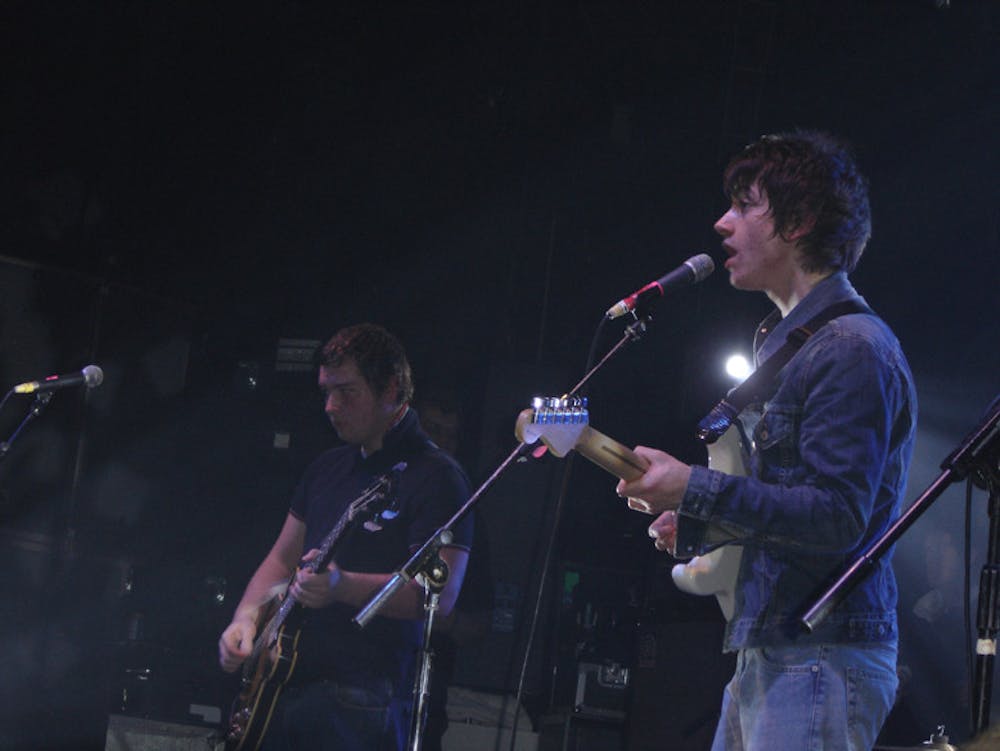On Oct. 21, the Arctic Monkeys released their seventh studio album, “The Car,” in competition with pop sensation Taylor Swift’s “Midnights” and cult-favorite Carly Rae Jepsen’s “The Loneliest Time.” But unlike the widespread reach of its pop counterparts — both Swift and Jepsen had songs from their albums go viral on TikTok — “The Car” has gone largely unnoticed across the internet.
“The Car” is the Arctic Monkeys’ first release since “Tranquility Base Hotel and Casino” in 2018. Fans of the band first heard about the album’s release from an Aug. 24 post on Instagram. The announcement was bare-bones, revealing just the album’s cover in the image and release date in the caption. Subsequent posts in the weeks leading up to the October release were similarly minimal, featuring tour dates and the announcement of singles from the album.
Despite a four-year pause, this new release feels reminiscent of the group’s last album. “The Car” continues the band’s sonic shift from the indie rock that first earned them their fame — featured heavily in their album “AM” — to the more orchestral, jazzy sound found in their last two albums.
This shift comes at a time in pop culture when some are calling for the revival of the “indie sleaze” aesthetic that reigned supreme in the early years of the social media platform Tumblr. The band was a mainstay of the app, with songs like “Why’d You Only Call Me When You’re High” defining a generation of users. And who could forget the love letter that the band’s frontman Alex Turner wrote to his girlfriend Alexa Chung with the famous line, “My mouth hasn’t shut up about you since you kissed it?”
Even after the end of the Tumblr era, old Arctic Monkeys songs have found popularity on TikTok as well, with “505” from their album “Favourite Worst Nightmare” spiking in popularity after going viral on the app.
But instead of embracing their original indie roots, the band seems to be going in a different direction. Growth is important in any group, and with the Arctic Monkeys 20 years past the release of their debut album “Whatever People Say I Am, That’s What I’m Not,” they were bound to experiment.
“There’d Better Be A Mirrorball,” released on Aug. 30, was the lead single off “The Car” and the first snippet fans had of the then-upcoming album. The first few seconds of the song are immediately reminiscent of “Star Treatment,” the intro to “Tranquility Base Hotel and Casino.” The song itself is powerful, with lyrics such as “Yesterday’s still leaking through the roof” and “I’d throw the rose tint back on the exploded view” tapping into a melancholy feeling of longing to mend a troubled relationship. But unlike “Star Treatment” — which deals with the band’s reflections on their waning popularity — “There’d Better Be A Mirrorball” adds an orchestral tone to its instrumentals, stripping the song down to its humble foundations.
Not every song off the album utilizes the same sound, with songs like “Jet Skis On The Moat” combining groovy synth with lyrical metacommentary on the song’s own absurdity. Lyrics such as “Pajama pants and a Subbeteo cloak” bring in details without any clear rhyme or reason. “Hello You” also plays with funky instrumentals, making it the most fun song on the album.
The titular track “The Car” plays with the same melancholic mood from the intro and serves as a lull between the two halves of the album. Regardless of the moody instrumentals, “The Car” is probably the most relatable song on the release, with the band making reference to imposter syndrome through lyrics such as “Your grandfather’s guitar/Thinking about how funny I must look.” The track plays with themes of insecurity that were also found in “Tranquility Base Hotel and Casino.”
The last track, “Perfect Sense,” acts in tandem with the intro to serve as fitting bookends to the album — though each song remains distinct enough to stand on its own. “If that’s what it takes to say/‘Good night’/Then that’s what it takes” are the final lyrics to the album, bidding goodbye to listeners as the work comes to a close.
The new album has seemingly solidified what fans can expect from the Arctic Monkeys in the future: a jazz sound that has become the group’s new trademark. Following the critical success of “Tranquility Base Hotel and Casino,” the new album rides on its predecessor’s coattails and, while enjoyable, fails to establish itself as an independent entity in the band’s discography. “The Car” also received similar critical success, a nod to the similarities between the two, though “The Car” is much moodier than “Tranquility Base Hotel And Casino” and its rock undertones.
The album also lacks features from other artists, which is standard for the Arctic Monkeys but could have helped the album establish a more unique identity. Since the band’s last album, there has been speculation that a collaboration with Lana Del Rey is in the works. But the closest thing fans of both artists have for now is Del Rey’s song “Dealer,” which was written for a shelved project with The Last Shadow Puppets — a band that includes Turner.
Though nothing special, “The Car” is enjoyable enough to satiate Arctic Monkeys fans until the next release. While it doesn’t have the same excitement as older albums in their discography, the album’s moodiness makes it a perfect listen for the fall.
Kaitlyn Torres was the senior editor of community for The Brown Daily Herald's 133rd Editorial Board. She previously covered diversity as a University News section editor. In her free time, Kaitlyn enjoys listening to The Arctic Monkeys and going on archaeological digs.





